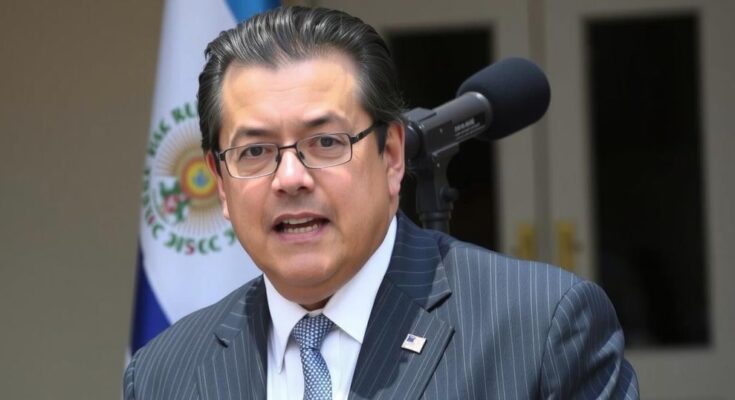Fernando Martínez, a Venezuelan opposition leader, left the Argentine embassy in Caracas after nine months of asylum. His departure raises questions about conditions faced by opposition figures, who allege harassment from government agents. Remaining members, including key aides to Maria Corina Machado, navigate ongoing state repression amid claims of essential service disruptions by the government, which denies the allegations.
On August 1, 2024, Fernando Martínez, a member of Venezuela’s political opposition, exited the Argentine embassy compound in Caracas after a nine-month refuge. His departure marks a significant event, as he was one of several opposition figures seeking asylum within the diplomatic premises. According to sources, he returned home, though the exact circumstances of his exit remain unclear.
The past months have seen opposition members, including Martínez, face constant pressure from Venezuelan intelligence agents and police stationed outside the embassy. They have alleged governmental malfeasance, claiming that the Maduro administration has deliberately disrupted essential services such as electricity and water. Despite these assertions, the government has denied any wrongdoing, thus escalating tensions between the embattled opposition and the ruling party.
Martínez previously held significant positions in Venezuelan politics, including serving as the minister of communications and transportation during the 1990s. He was involved in establishing a shadow government formed by opposition figures following Nicolás Maduro’s contentious reelection in 2018, which many believe was marred by electoral fraud. While Martínez has exited the embassy, others affiliated with opposition leader Maria Corina Machado remain, continuing to navigate a perilous political landscape closely surveilled by the government.
The implications of Martínez’s departure from the embassy could resonate within the broader context of Venezuelan politics, particularly concerning the strategies employed by the opposition in response to ongoing governmental repression. Among those still inside the embassy are key figures in Machado’s campaign who have faced government charges related to allegations of promoting violence, highlighting the precarious situation of opposition members seeking asylum.
Overall, the dynamics surrounding Martínez’s exit from the Argentine diplomatic compound encapsulate the struggles faced by Venezuelan opposition members amid governmental scrutiny and intimidation, illustrating the complex interplay of political asylum and state power in Venezuela.
The political crisis in Venezuela has escalated significantly over the years, characterized by economic collapse, social unrest, and controversies surrounding election legitimacy. The administration of Nicolás Maduro has faced widespread accusations of authoritarianism, including using arbitrary detainment and systemic repression against the opposition. Following Maduro’s disputed victory in the 2018 presidential election, many opposition leaders, including Fernando Martínez, sought refuge and assistance from foreign embassies as the government’s grip on power tightened. The increasing number of political exiles seeking asylum has become a pressing issue in regional diplomacy, particularly affecting relations between Venezuela and countries that harbor opposition members.
In conclusion, Fernando Martínez’s departure from the Argentine diplomatic compound underscores the fragility and uncertainty faced by Venezuelan opposition figures. As they continue to seek refuge from governmental persecution, the endurance of the opposition against an increasingly oppressive regime highlights the volatility of Venezuela’s political landscape. The ongoing challenges surrounding accusations of state-sponsored intimidation and the quest for asylum reveal the complex realities of political dissent in the country.
Original Source: apnews.com




